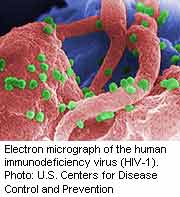
WEDNESDAY, Aug. 21 (HealthDay News) — Giving immediate drug therapy to HIV-infected infants for a limited period of time protects their immune system and delays the start of lifelong treatment, according to a new study.
HIV is the virus that causes AIDS.
Currently, infants who begin so-called antiretroviral therapy must continue for life. However, long-term use of the therapy increases their risk of drug-related toxicity and drug resistance, according to background information in the study published Aug. 22 in The Lancet.
“This important finding indicates we may be able to temporarily stop treatment and spare infants from some of the toxic effects of continuous [antiretroviral therapy] for a while, if we can monitor them carefully,” study co-leader Mark Cotton, a professor at Stellenbosch University in South Africa, said in a journal news release.
“With [antiretroviral therapy] coverage in children currently at just 28 percent, our findings highlight the urgency of increasing early (within the first 3 months of life) testing and treatment of HIV-infected infants,” he added.
The researchers looked at five years of follow-up data from 377 HIV-infected infants who, at ages 6 weeks to 12 weeks in 2005, were randomly selected to begin immediate short-term antiretroviral therapy of 40 weeks or 96 weeks, or to wait until they showed signs of illness or a weakened immune system before beginning treatment.
On average, infants in the delayed-treatment group needed to begin taking lifelong therapy 20 weeks after the start of the study. In comparison, those completing the immediate course of treatment for 40 weeks were able to then delay restarting treatment for an average 33 weeks, and those who completed the immediate course of 96 weeks of treatment were able to delay restarting treatment for an average 70 weeks, the investigators found.
By the end of the trial, nearly 20 percent of infants who were given 40 weeks of early treatment and about one-third of infants who received 96 weeks of initial antiretroviral treatment were still well enough to avoid restarting what would eventually become lifelong treatment.
The researchers also found that the delayed-treatment group had a significantly higher number of deaths and hospital admissions, and had higher health care costs than the groups of infants who received immediate, temporary antiretroviral therapy.
“Early treatment followed by a break is definitely better and more cost-effective than delaying starting infants on treatment. But we do not know if a longer initial period of treatment, or early continuous treatment, might be even better,” study co-leader Dr. Avy Violari, from the University of the Witwatersrand in South Africa, said in the news release.
More information
AIDS.gov has more about children and HIV.
Copyright © 2026 HealthDay. All rights reserved.

